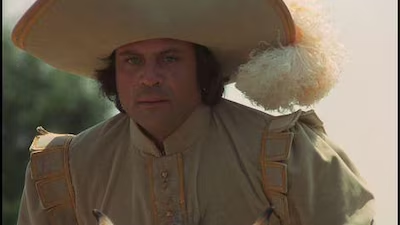The Four Musketeers

Brief Synopsis
Cast & Crew
Richard Lester
Film Details
Technical Specs

Synopsis
The Four Muskateers, D'Artagnan, Athos, Aramis, and Porthos, reject the plans of Lady de Winter to remove Queen Anne from power. Furious, Determined to get revenge, de Winter tries to ruin D'Artagnan's romance with the beautiful Constance by seducing him. When that fails, she convinces Rochefort to kidnap Constance, and oversees the plot to assassinate D'Artagnan's good friend, the Duke of Buckingham. When the musketeers learn of the kidnapping and assassination, they set off to free Constance and seek justice against de Winter.

Director

Richard Lester

Videos
Movie Clip



Hosted Intro
Film Details
Technical Specs

Award Nominations
Best Costume Design
Articles
The Four Musketeers -
Lester was looking for a comeback when the Salkinds, father Alexander and sons Michael and Ilya, approached him about directing the 16th big-screen version of Alexandre Dumas' classic novel about three members of the royal guard, their new colleague D'Artagnan, and the vicious plots of Cardinal Richelieu and Milady de Winter. Lester had scored major hits by putting The Beatles on screen in A Hard Day's Night (1964) and Help! (1965), but later missteps had killed his career momentum. At the time, he had not made a film since the off-beat science-fiction comedy The Bed Sitting Room (1969) four years earlier.
Originally, the Salkinds had hired Tony Richardson, the Oscar®-winning director of Tom Jones (1963), to helm the film, but they parted ways over artistic differences. Since they also hoped to cast The Beatles in the four male leads, Lester seemed the logical choice to replace Richardson. That casting idea fell by the wayside, however, when they decided the rock group's personalities would overshadow the plot and characters. Instead, they assembled an all-name cast headed by Michael York as D'Artagnan, Faye Dunaway as Milady, Raquel Welch as Constance, Geraldine Chaplin as Queen Anne, Richard Chamberlain as Aramis, Oliver Reed as Athos, Christopher Lee as Rochefort and Jean-Pierre Cassel as Louis XIII. They offered Charlton Heston one of the musketeer roles but, feeling they were subsidiary to York's role, he opted instead for a cameo appearance as Cardinal Richelieu.
After 20 weeks of shooting in Spain, the Salkinds realized they had enough material for two films, so that's what they released, sending out The Three Musketeers in 1973, with The Four Musketeers scheduled to appear a year later. This did not sit well with the cast, who promptly sued to be paid for making a second picture. They won, but the courts did not award them as much as they would have made for another film. Because of the case, however, the Screen Actors Guild began adding what they call the "Salkind clause" to all film contracts, stipulating exactly how many films are being made.
Both films were major hits and received strong reviews, with special notice going to Welch for her surprisingly effective comic performance. At the time she was only thought of as a sexy set dressing in a series of mostly forgettable films. The Three Musketeers won Welch a Golden Globe for Best Actress in a Musical or Comedy while also being named Best Comedy in the London Evening Standard Film Awards. The sequel copped a second London Evening Standard Award.
In 1989 Lester reunited with York, Reed, Frank Finlay, Chaplin, Roy Kinnear, Lee and Chamberlain for a sequel, The Return of the Musketeers, loosely based on Dumas' Twenty Years Later. Cassel also appeared in the film, but in a new role, as Cyrano de Bergerac. At least in the sequel he got to use his own voice. With the large number of British and American actors playing leads in the earlier films, his voice was dubbed by British actor Richard Briers. York would return to play D'Artagnan in a 2004 television movie, The Lady Musketeer, with Susie Amy as his daughter and Gerard Depardieu as Cardinal Mazarin.
Producer: Alexander Salkind, Ilya Salkind, Michael Salkind
Director: Richard Lester
Screenplay: George MacDonald Fraser
Based on the novel by Alexandre Dumas
Cinematography: David Watkin
Score: Lalo Schifrin
Cast: Oliver Reed (Athos), Raquel Welch (Constance de Bonancieux), Richard Chamberlain (Aramis), Michael York (D'Artagnan), Frank Finlay (Porthos), Christopher Lee (Rochefort), Geraldine Chaplin (Queen Anne of Austria), Jean-Pierre Cassel (Louis XIII), Faye Dunaway (Milady), Roy Kinnear (Planchet), Michael Gothard (Felton), Simon Ward (Duke of Buckingham), Charlton Heston (Cardinal Richelieu), Sybil Danning (Eugenie)
By Frank Miller

The Four Musketeers -
Quotes
You know, it strikes me that we would be better employed ringing Milady's pretty neck than shooting these poor devils of protestants. I mean, what are we killing them for? Because they sing psalms in French and we sing them in Latin?- Porthos
Porthos, have you no education? What do you think religious wars are all about?- Aramis
"By my hand and for the good of the state; the bearer has done what has been done". Hm. One should be careful what one writes for one never knows into whose hands it may fall.- Cardinal Richilieu
It is too much! I cannot accept it. Athos, you take it.- D'Artagnan
No, for the Comte de la Fere it is too little; for Athos, too much.- Athos
I need a bath. I reek of England and Protestantism.- MiLady DeWinter
Trivia
Filmed at the same time as Three Musketeers, The (1973).
Director Richard Lester was sued by the actors who claimed they were tricked into thinking the film was to be part of Three Musketeers, The (1973). They won their case in court, but did not receive as much money as they would have if they were paid separately for both films.
Miscellaneous Notes
Released in United States 1975
Released in United States 1975















